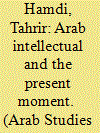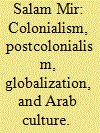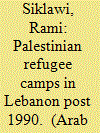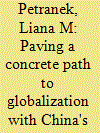|
|
|
Sort Order |
|
|
|
Items / Page
|
|
|
|
|
|
|
| Srl | Item |
| 1 |
ID:
164743


|
|
|
|
|
| Summary/Abstract |
The Iraqi poet Saadi Youssef urgently asks, “Why are the poets silent?/Where have they gone?” These questions underscore the compelling need for the guiding voices of Arab intellectuals at this deeply divided present moment in the Arab world that has effectively seen the destruction of seemingly stable nations and identities. It is important to understand why and how easily “things fell apart” for Arab nations and peoples under the destructive influence and direct intervention of imperialist and Zionist agendas and forces. What does it mean to speak truth to power in the current Arab and global context where the destruction of Arab nations, such as Iraq, Syria, Libya, and Yemen has become the all too familiar, convenient, and accepted status quo, which is marked by destructive and exclusionary discourses? It has become incumbent upon the Arab intellectual/writer/poet to lead the self-examination process in order to provide an understanding of the current Arab situation within its greater global context and construct a revolutionary and insurrectionary oppositional discourse that would expose and dismantle the current defeatist and divisionary discourses. Antonio Gramsci's concepts of hegemony and consent, Louis Althusser's ideological state apparatuses, and Edward Said's important ideas on the intellectual's critical consciousness, secular criticism, and beginnings are the theoretical lenses used to help decipher the catastrophic happenings in the Arab world. This study also examines excerpts of literary works by important Arab poets/intellectuals, such as Mahmoud Darwish, Mourid Barghouti, Bader Shaker Al-Sayyab, Saadi Youssef, and Yusuf Al-Ani.
|
|
|
|
|
|
|
|
|
|
|
|
|
|
|
|
| 2 |
ID:
164742


|
|
|
|
|
| Summary/Abstract |
This article will address two major related issues regarding Arab culture as an integral part of the globalization ethos. In order to expand the conceptual parameters of globalization and cultural studies, the exclusivity of political and economic globalization will be interrogated in favor of a more diverse, humanitarian definition of the term. At the heart of this argument, inflected by interdisciplinarity and the literature and theory of postcolonial studies, is tolerance, respect, and recognition of difference and for the marginalized voices of the “other.” The theoretical framework challenges the stereotyping, homogenization, and misrepresentation of Arabs, colonialist ideas that have been carried over into the practice of globalism and the marginalization of Arab history and culture within world heritage. It is my hope to correct the negative perceptions about the Arab people, mainstream misperceptions of politicians, the media, and public discourse. The article will underscore the diversity and complexity of the identity and history of people in the Middle East and North Africa. Although in the West Arabs are usually synonymous with Muslims, a discussion of Islam and/or Islamophobia will not be addressed in this article. The first part will elaborate on the historical context of the creation of the modern Arab world. Next, various definitions of the main domains of globalism and their correlation to the contemporary Arab world will be summarized. Integrated into both sections are two major issues: the creative resistance that has accompanied the founding of the modern Arab world and the impact of globalization on Arab society, concepts that have played out in the containment of this region.
|
|
|
|
|
|
|
|
|
|
|
|
|
|
|
|
| 3 |
ID:
164746


|
|
|
|
|
| Summary/Abstract |
This article will discuss Israeli machinations to covet substantial areas of the Lebanese maritime exclusive economic zone, while knowing full well that international law has sided with Lebanon in this matter. The conflict between Israel and Lebanon will be discussed in the context of the relations among regional states and the conflict of East Mediterranean states over maritime oil and gas fields. Main questions that arise in this regard are as follows: First, is it a matter of oil and gas reserves over and above its share that Israel is seeking to capture or does the controversy have to do with regional domination or both? Second, what is the significance of the US envoys’ visits in early 2018 to Beirut, presumably to resolve the disagreement between Lebanon and Israel? Third, have those visits defused the situation between the two states involved or added fuel to the fire? Fourth, what is the significance of Israel's occupation of parts of Lebanon's territory to the issue of offshore oil and gas and how might it relate to the cement wall that Israel has been constructing partially in Lebanese territories? Fifth, what is the probability of an Israeli attack on Lebanon that could quickly transform into a regional conflict?
|
|
|
|
|
|
|
|
|
|
|
|
|
|
|
|
| 4 |
ID:
164744


|
|
|
|
|
| Summary/Abstract |
This article addresses the issue of the Palestinian refugees in Lebanon, their camps, their resistance, and the challenges they have been facing “as refugees” to survive in the deeply divided state of Lebanon and to return to Palestine. Currently there are about 450,000 Palestinian refugees scattered among 12 official and recognized Palestinian refugee camps in Lebanon as well as many refugee gatherings; this number is part of the 6 million Palestinian refugees who are scattered in the world as a result of the establishment of the Zionist entity in 1948. However, on December 11, 1948, the United Nations General Assembly issued the UN resolution 194, during its third session, which stipulated that Palestinians have the right of return to their homes in Palestine. The Palestinian right of return is a Right and therefore it is not negotiable and cannot be compromised under any condition and/or circumstance. There have been continual attempts and proposals to terminate this Palestinian right of return to historic Palestine. To stop these toxic proposals from reaching their goals and to achieve their strategic goal, the Palestinian resistance has the legitimate right to use any means necessary, including armed struggle against the occupiers. The Palestinians in Lebanon are part of this process and they have been struggling on all levels to achieve their civil and human rights in order to improve their social and economic conditions in their refugee camps. Furthermore, the Palestinians have the legitimate right to continue their national struggle against Israel, which is the only way for the Palestinians to achieve their national goal for total liberation. However, there have been additional challenges affecting the Palestinians and their refugee camps in Lebanon post 1990; by the end of the Lebanese Civil War, the Palestinian refugee camps witnessed the emergence and growth of takfiri groups. Consequently, the Palestinian refugees have been sandwiched between oppressive Lebanese rules and the rise of the takfiris inside the camps. The article attempts to answer the following questions: What are the challenges affecting the Palestinian refugees in Lebanon? How can the Palestinians protect their identity from erasure and achieve their right of return to Palestine? Which internal and external groups currently control the camps? In what ways has takfiri ideology impacted the Palestinian identity? How can the Palestinian refugees and their camps survive under such conditions?
|
|
|
|
|
|
|
|
|
|
|
|
|
|
|
|
| 5 |
ID:
164741


|
|
|
|
|
| Summary/Abstract |
This article discusses China's economic development and political influence in the Middle East, and the construction of China's Belt and Road Initiative (BRI). It also discusses Xi Jinping's vision for relationships with the Middle East states as its natural partners, the China-Arab States Cooperation Forum (CASCF), the law of value, and the antagonistic contradictions China will encounter in its path to accumulation with US hegemony in the region.
|
|
|
|
|
|
|
|
|
|
|
|
|
|
|
|
|
|
|
|
|